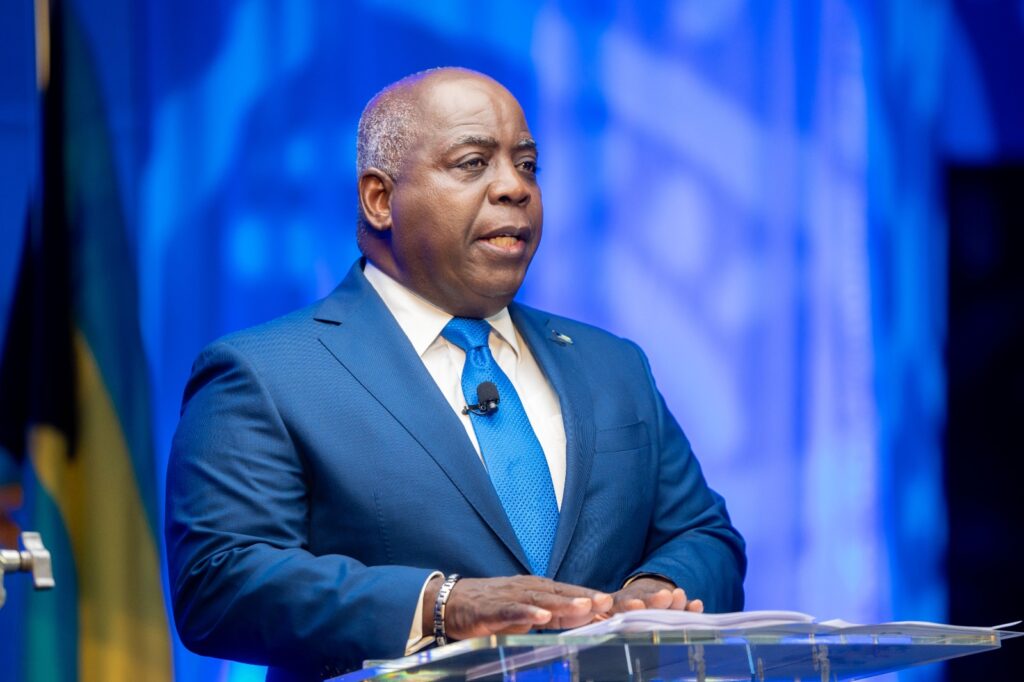
NASSAU, The Bahamas – Fighting Climate Change and fighting for fair climate financial support are crucial to the survival of The Bahamas, according to Prime Minister and Minister of Finance, the Hon. Philip Davis.
He made the statement during his first National Address, delivered Tuesday, October 11, 2022 in a live broadcast heard around the country.
In the 36-page document, the prime minister shared the progress of his administration so far and plans for education, food security, job readiness, health care, national security, climate change, and more measures for the way forward.
Since being elected to office on September 16, 2021, Prime Minister Davis has led discussion on Climate Change and its dire impact on Small Island Developing States, such as The Bahamas. He also called for financial support in dealing with this impact; and in his remarks he described how Carbon Credits can play a positive role in mitigating this dilemma.
Prime Minister Davis noted that the building of coalitions to have a more unified, powerful, say on the world stage is most effective in delivering a clear message. However, as momentum gathers, The Bahamas must speak up, take matters into its own hands, he said: one important measure in garnering climate financial support is to introduce new legislation for carbon credits — an early priority in the first year of his administration.
“Because the threats posed by Climate Change are now widely acknowledged to be serious and imminent, countries and corporations are making a transition from carbon-emitting fossil fuels to renewable energy sources like solar and wind.
“But it’s going to require a massive and very expensive change to energy infrastructure, all over the world; so it won’t happen overnight.
During the transition, our existing energy systems will continue to push carbon dioxide into the atmosphere,” the prime minister said.
He also observed that many countries and companies are required to compensate for those emissions by buying carbon credits. Carbon credits are a way to pay the planet back for the harm caused by those continuing emissions.
“What we in The Bahamas are now doing is working to become the first in the world to sell blue carbon credits. We have been working with top scientists to map and verify our mangroves and seagrass meadows, so that we can begin trading carbon credits.
“So, we are innovating in a way that is going to protect our environment, and bring in what we believe will become a very important source of revenue for The Bahamas,” the prime minister said.
Last week, the International Monetary Fund (IMF) while downgrading the Bahamian economy, also cited that it is vulnerable to climate shocks that are likely to come with increasing frequency and intensity.
“So, when they look at our country, they are pricing in a high probability of future Hurricane Dorians – and saying, essentially, that they believe we have a worse outlook than other countries who have similar economic and fiscal situations, but less climate risk,” the prime minister said.
He added, “Now you understand why I spend so much time and energy on the issue of Climate Change…. Fighting climate change, and fighting for fair climate finance, is central to our country’s ability to thrive.
“Actually, it’s central to our country’s ability to survive. That’s why we call it an existential threat.”
The prime minister deemed it important for The Bahamas to lead the way in this activism. Hence, it’s why he hosted regional leaders to the first-of-its-kind conference in Nassau recently, to present a stronger voice in the upcoming COP27 – the UN Climate Change Conference, November 2022, in Egypt.
“A lot of important decisions will be made then about how to compensate countries like ours for our climate debt and risks,” he said.
He noted that The Bahamas has contributed only the tiniest percentage of the world’s global emissions, yet it is on the frontline — consistently rated as one of the countries most at risk.
“The wealthiest countries on earth have become so wealthy by using oil, gas and coal to produce energy and power; their industrialization, and these fossil fuel emissions pump massive amounts of carbon dioxide into the atmosphere.
All that carbon dioxide in the atmosphere traps more of the sun’s rays, heating up our planet. And that warming is having all kinds of climate effects – including rising sea levels and more intense hurricanes,” the prime minister said.
He concluded: “I don’t want our country to be forever trapped by this cycle of destruction, tragedy, and debt. That’s why we’re fighting for change.”







